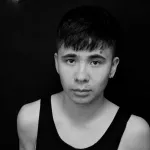A Poetry Mixtape Edited by Kirsteen MacLeod
Kirsteen's Liner Notes
In this mixtape you’ll encounter a multiplicity of fathers, from the noble and beloved to the troubled, damaged and downright dangerous—and their sons and daughters, who wrote the poems.
I find it curious that in everyday life, we don’t often speak openly and intimately about the father. He tends to be a stereotype, or undefined, like a quick, featureless pencil sketch.
Fortunately, in poetry, an intimate medium, we find fathers in their full, flawed humanity—kind, lost, dead, comical, cruel, and oftentimes, ricocheting between extremes.
I’m always trying to understand my own complicated relationship with my tormented and tormenting father, and writing poems about it. I suspect that fathers, viewed through the haze of years, can’t be clearly seen, can only be guessed at by their children.
The poems in this mixtape show how complex bonds with our fathers, whether positive or negative, have the power to shape, and even haunt us. The poems are intense. Many vibrate with an uncommon violence of feeling. Others hold a charge, feel volatile, as though something under pressure might explode from the page. I’m struck, too, by how often the poets’ fathers appear as near-mythical figures.
Why this powder-keg, heightened vibe? I laughed in recognition when, reading Real Sofistikashun: Essays on Poetry and Craft by poet Tony Hoagland, I came to the chapter called “Obsession: ‘Are You Still Writing About Your Father?’” “A real diehard, indestructible, irresolvable obsession in a poet is nothing less than a blessing,” Hoagland writes. “Passion is the greatest gift a poet can have,” he adds, “and nobody is mildly obsessed.”
Fathers are a fixation. Stanley Kunitz was 64 when he wrote “The Portrait”: “My mother never forgave my father/for killing himself,/especially at such an awkward time”—weeks before the poet’s birth. In Susan Musgrave’s “You Didn't Fit,” grief collides with comedy as a daughter recognizes herself in her father: “You wouldn't fit in your coffin/but to me it was no surprise.” In Donika Kelly’s harrowing “From the Catalogue of Cruelty,” a violent, sexually abusive father figuratively devours his own children: “He tried to take us/into his body, which was the house/the police entered.”
In “Forgiving My Father,” by Lucille Clifton, there’s empathy, but also rage, a reckoning: “today is payday, payday old man/my mother’s hand opens in her early grave.” In Tina Cane’s “Imaginary Dad,” the abandoned child-speaker eats Twizzlers, watches Apocalypse Now, and whenever a solider appears on the screen, thinks, “Now, there’s a dad/if I ever saw one.” Lynn Crosbie, in “Modestine,” artfully threads a story that’s being read aloud to a dying father with the speaker’s feelings for him, and reminds us how, looking back, everyday things may seem special—“my father’s good breathing/The kinds of sounds that strike like hammers, later on in life.”
Poetry, which insists on truth and refuses to oversimplify, provides us with reality that’s clarified and magnified. Taken together the poems in this mixtape aim to create a truer, sharper portrait of fathers, and of our complex relationships with these pivotal figures in our lives—beloved, despised, absent, and usually, far from perfect.
The Poems
J-Card (PDF)
Recommended reading
“An Elliptical Stylus,” Don Paterson, from Nil Nil
http://poemfortheday.blogspot.com/2017/12/an-elliptical-stylus-don-paterson-my.html
“I Carried My Father Across the Sea,” Gbenga Adesina
https://www.narrativemagazine.com/issues/fall-2019/poetry-contest-winners/i-carried-my-father-across-sea-gbenga-adesina
Sonnets for Albert, Anthony Joseph
https://www.bloomsbury.com/uk/sonnets-for-albert-9781526649942/
Dialogues (Against Literature), Jennifer Chang
“Dad, Leave Mom,” Michael Mark, chapbook, Visiting Her in Queens is More Enlightening Than a Month in a Monastery in Tibet, https://losangelesreview.org/book-by-michael-mark-review-and-interview-by-brent-ameneyro/
“After the Funeral,” Roger Reeves, from Best Barbarian
https://lareviewofbooks.org/article/two-roads-a-review-in-dialogue-of-roger-reevess-best-barbarian/
“The Lifeboat,” Kerry Lee Powell, from Inheritance
http://www.biblioasis.com/shop/poetry/inheritance-trade-paper/
“The Same City,” by Terrance Hayes
https://www.poetryfoundation.org/poems/48954/the-same-city
“The Hospital Window,” by James Dickie
https://www.poetryfoundation.org/poems/42722/the-hospital-window-56d221579902a
The Renunciations, Donika Kelly
https://www.graywolfpress.org/books/renunciations
“Spree,” by Maxime Kumin
https://www.poetryfoundation.org/poems/43091/spree
“At the Table with God and My Father,” B. William Bearheart
https://poets.org/poem/dinner-table-god-and-my-father
“Daddy,” Sylvia Plath
https://www.poetryfoundation.org/poems/48999/daddy-56d22aafa45b2
Poems about Fathers, Poetry Foundation:
https://www.poetryfoundation.org/collections/101752/poems-about-fathers
Poets.org Father poems











